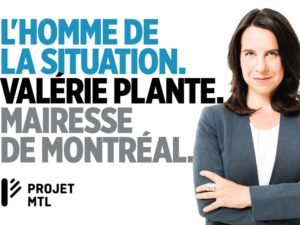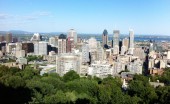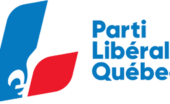Re Ian Bremmer 'Could third-party candidates upend the 2024 US election?' 3 April The current political movement in the USA…
Montreal 2017 -2018
Written by Diana Thebaud Nicholson // December 28, 2018 // Montreal // Comments Off on Montreal 2017 -2018
CBC News Montreal
Montreal 2016
COUNTDOWN to 2022 Turning the corner on Montreal roadwork
Sign The Montreal Petition To Stop Valerie Plante From Closing Mount Royal
They’ve hiked your taxes, broken promises – and now they’re removing the nicest drive in town.
Birth of a local living history collection
The Atwater Library and Montreal Island seniors construct a Living History Collection
By Wanda Potrykus
The honeymoon’s over for Montreal Mayor Valérie Plante
Taxes, traffic, Mount Royal, even a new premier: mayor faced many challenges in 2018.
Plante lost her lustre over the past year. Elected with 51 per cent of the vote when she unseated Coderre in November 2017, she would now only manage 42 per cent of the vote, according to a recent Léger survey. That’s four percentage points less than Coderre garnered last year.
Anglophone Montrealers seem particularly perturbed by Plante. Only 35 per cent of anglophones said they would vote for Plante today, compared to 53 per cent among francophones. More than half of anglophones surveyed said municipal taxes are too high, compared to 44 per cent among francophones.
The two language groups do agree on one topic: 70 per cent of francophones and 60 per cent of anglophones say Plante has not done enough to improve traffic flow on Montreal roads.
26 December
Only in Montreal, 2018: New Champlain Bridge delay shocks no one
The ultimate date of completion of the new span has become a bit of a joke with Montrealers.
The Oct. 25 announcement by federal Infrastructure Minister François-Philippe Champagne that the new span would not be ready by its scheduled Dec. 21 completion date, but rather by a new deadline of June 2019 “at the latest,” was definitely among the frontrunners for the title of most predictable local news story of the year. (Technically, this wasn’t even the first announced delay; in April the federal government and SSL, the consortium behind the new bridge project, declared that the initial Dec. 1 deadline had been pushed back by a mere three weeks).
18 December
City will follow recommendations on Camillien-Houde project, Plante says
The consultation process has wrapped up and the office has been publishing some of the testimony it collected online while it prepares a report, due sometime in the coming months. If some believed the project physically divided the city, road users were equally divided on its merits. Two competing petitions surfaced, one in favour of blocking the road and the other against. Both were signed by thousands. At the first public consultation meeting, though, the against camp made itself loudest.
8 December
Freed: Can Montreal make a delicious bagel that’s politically correct?
We live in new times when health and safety concerns often clash with traditions — and Montreal’s wood-fired bagel is under fire.
… early this week Plateau-Mont-Royal borough banned all new wood-burning cooking ovens.
They’re also pressing existing shops to build a better, less polluting bagel that conforms to new Montreal air pollution guidelines under “règlement 90, article 5.66. & 3.01.”
Like many, I grew up at the St-Viateur bagel factory — a popular hole-in-the-wall opened in 1957 and long owned by Joe Morena and sons.
In quest of the hole-y grail, St-Viateur’s original shop has become a virtual bagel research lab, testing expensive air purifiers to produce a more “environmentally-friendly and socially responsible bagel,” says Joe’s son, Robert Morena.
On Thursday night, the family issued an excited press statement, announcing a historic breakthrough. Their latest sophisticated new purifier has been thoroughly tested by city environmental inspectors who just informed them they are far under the city’s new Règlement 90 emission norms.
“The good news is the Montreal wood-burning bagel has been saved,” says Joe, with delight.
4 December
Restricting cars on Mount Royal doesn’t improve safety: CAA Quebec
The group says building two roundabouts would promote a better sharing of the road among cyclists, pedestrians and motorists.
Traffic safety expert Marco Harrison said a goal of Vision Zero, to which the city subscribes, is the safe sharing of roads for all forms of traffic — and not at the exclusion of a major group. It is an international safety project that would see zero fatalities or serious injuries involving road traffic. … He was critical of the city’s pilot project to ban cars from using Mount Royal’s Camillien-Houde Way and Remembrance Rd. as a thoroughfare across Mount Royal. Harrison said he believes the experiment did not solve the basic problems of road sharing on the mountain — and might even have made it more dangerous. … He said CAA-Quebec surveyed its members who said the pilot project caused them an average increase of 21 minutes to get to where they wanted to go on the mountain — a 68 per cent increase in their travel time.“ And those people were on the city’s main roads, causing traffic for other users,” he said.
1 December
Josh Freed: Oh Ste-Catherine, I hope we don’t ruin you
The plan to remake the street gets more nerve-racking all the time, especially with new mortal enemies like the proposed Royalmount mall.
Dear Ste-Catherine:
The plan to remake you gets more nerve-racking all the time, especially now that you face new mortal enemies, like the proposed Royalmount mall.
It’s Monster-malls versus Main Street, a perfect storm that’s got me nervous, my saintly friend.
I was onboard with the city’s plan to re-design you into something more, well … pedestrian, Catherine. But I’m re-thinking that now that your own shop-owners are upset with some of the plan.
Downtown Montreal is a one-street wonder — among the liveliest on the continent — and you, Catherine, are both our Main Street and Grand Dame.
Your 500 spots can get used by different motorists every hour, perhaps 4,000 a day. That’s why shop owners have been waiting with frustration for city hall to announce alternative parking arrangements.
Their 8,000-shop association has now strongly requested that an underground parking lot be built beneath McGill-College Ave., soon to become a public square. That’s a routine solution everywhere from Burlington to Barcelona to replace on-street parking.
But Projet Montréal wants to make a statement about cars, whether on Mount Royal, or downtown, Catherine, and they don’t seem to have parking lots in their DNA.
27 October
Josh Freed: Make your voice heard on the future of Mount Royal
In November, the city’s consultation office will ask our opinion of the “pilot project” that blocked through-traffic for most vehicles.
In November, the city’s consultation office will ask our opinion of the “pilot project” that blocked through-traffic for most vehicles. Here’s my official submission. I urge you to make your views known in the coming weeks — whatever side of the mountain road you’re on.
I bike up the mountain several times a week on the dirt road and often check what’s happening on the stretch of main road that’s been closed to traffic all summer.
I can sum it up in a two words: absolutely nothing.
The once busy-with-cars throughway between Beaver Lake and Smith House is virtually deserted. There are some buses, police and city vehicles — and a handful of passing cyclists.
But they’re almost all men in their 20s and 30s. There are barely any older bikers, or women — Camillien Houde Way’s 10-degree climb is too gruelling for 95 per cent of Montreal cyclists to enjoy.
There are no pedestrians on the closed stretch, either, except those waiting for buses. Who would possibly walk on asphalt when lovely Beaver Lake and the Chalet lookout are so close by?
So almost nobody has benefited from this truncated road that has upset so many Montrealers.
11 August
Josh Freed: Montrealers are being insulted by city’s ‘consultations’
Whether it’s to do with Mount Royal traffic or Phillips Square kiosks, citizens’ opinions are either being ignored or twisted.
The purpose of consulting should be to learn what citizens want, not use them as rubber stamps for what government wants.
This matters now, since we’re starting our consultations on Mount Royal’s pilot project, which many fear is permanent, given how a 32,000-person petition was ignored.
The city’s independent “consultation office” is in charge, so it should be impartial, but it hasn’t been an ideal start.
6 August
Iroquois village dug up downtown on Peel Street
(The Eastern Door) After 11 long months of digging, archaeologists from the private company Ethnoscop have publicly announced the discovery of thousands of fragmented artifacts of a prehistoric St. Lawrence Iroquoian village. … The archaeologists are now working on finding exact dates for the artifacts – which range from shards of pottery, ceramics, animal bones and work tools.
With the use of carbon dating, they believe they might be from the late 14 century, around 1375 -1400 A.D. … Archaeologists had hopes that the village found was that of the elusive Hochelaga village, but seems to be too old to be possible. “Hochelaga is the St. Lawrence Iroquoian village that was visited by Jacque Cartier in 1535 and is the only description we have from a European of what a St. Lawrence Iroquoian village looked like,” said Gate St-Pierre.
3 August
Phillips Square vendors struggle to grasp why they were asked to leave
The city began consultations on redeveloping Ste-Catherine with a forum in the fall of 2014, then went on to conduct four public workshops and a survey on Phillips Square. Individuals and organizations were encouraged to file briefs on the project.
A one-page summary of the 2015 survey — which garnered 584 responses — does not mention removing the vendors, but under the section “other comments” suggests to “better illuminate the square and the monument.” Other suggestions noted: more chairs and tables, greenery and flowers, Wi-Fi and other amenities. …
“The big question mark” that remains, according to Meghan Joy, an assistant professor of political science at Concordia University, is how governments turn public consultations into decisions.
“There is this tendency of, ‘We’ve already made the decision, we need to check this box of public approval and then we’ll go ahead with it,’ ” she said.
It’s important that governments establish and follow criteria for carrying out consultations, Joy said. That includes steps like distributing information on the content of the consultations in advance, sending out summaries of participants’ comments, taking time to make the decision after the consultations and staying in touch with the public afterward. All of that takes money and time, Joy said.
26 July
‘Flagrant disregard’ for safety triggers bike ban in Mount Royal Cemetery
The cemetery says the decision was made after repeatedly seeking the cooperation of cyclists, “as guests on our private property.”
Mount Royal Cemetery is banning cyclists from its grounds as of Aug. 1, saying high-speed riders are showing “flagrant disregard of the safety of pedestrians and of the character of the cemetery.”
… in recent years, spandex-clad bikers who speed down its winding paths have been threatening the safety of mourners and the site’s tranquility, [said David Scott, the executive director of Mount Royal Commemorative Services.] The cemetery has made repeated efforts over the past two years to get competitive cyclists to slow down and respect the sanctity of the environment, all to no avail, he said.
23 July
This is obscene
Clark St. car-tastrophe: Brand new median to be torn up
(CTV) The brand new median separating bike path from car traffic on Clark St. in the Plateau will be torn up and made smaller after it was determined the lane would make it impossible for emergency vehicles to squeeze between parked cars.The road was recently dug up near around the Laurier intersection to make way for a bike path protected by a concrete median wide enough to plant trees. It was installed only three weeks ago.
4 July
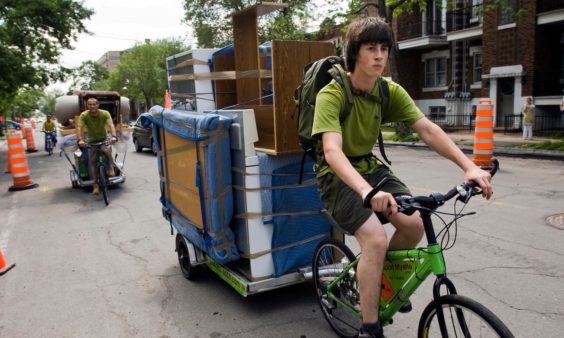
Celine Cooper: Why do Quebecers put up with July 1 moving day hell?
Contrary to popular belief, it is not a sovereignist complot to diminish Canada Day celebrations in Quebec.
(Montreal Gazette) As the Gazette’s Jacob Serebrin explained (“Brace yourself, Moving Day is almost here” Montreal Gazette, June 29), the official July 1 moving date is a practice with origins in the French colonial period, when leases were to expire May 1, to prevent tenants from being evicted in the winter. In time, the law required urban leases to begin on May 1 and end on April 30. Fast forward to 1973, when the Liberal government abolished the law and pushed moving day back to July 1, in part to prevent children being pulled out of school before the end of the year.
The July 1 moving day in Quebec is an artificial rental timetable. It’s no longer the law, but rather an inconvenient custom that serves little purpose. There are many traditions worth saving, but I can’t think of a single reason to salvage this one. I say phase it out. It’s time to move on.
29 June
Montreal Moving Day: what happens when a whole city moves house at once?
By Mireille Silcoff
(The Guardian) Montreal has a valiant knack for inconvenience. The winters are brutal, and when summer finally comes, one can safely bet that any well-attended park, shopping street or highway will become clogged with construction, as every builder in the province takes two weeks off at exactly the same time in July. The Quebecois love doing things all together, en famille – and in that spirit there is Moving Day: 1 July, when the majority of residential leases both begin and end.
The mess of Montreal’s Moving Day is enhanced by the fact that it is not primarily a city of homeowners, but one of relatively cheap rents. Close to 63% of the city’s 1.6 million people rent their homes, and about 10% of the population are said to be moving house in any given year, or about 160,000 people. It is estimated that 130,000 of these will do so on Moving Day, according to the Montreal Gazette.
Prasun Lala, a technology researcher at McGill University and the École de Technologie Supérieure, argues that Montreal’s well-stocked rental market is to blame for the puzzling persistence of Moving Day.
Like so many aspects of Quebecois culture, including well-loved songs, recipes and turns of phrase long forgotten in France, Moving Day has its roots in the province’s colonial past. In 17th- and 18th-century Quebec, there was a fixed date – 1 May – for many legal agreements. It took until the 1970s for the Quebec government to abolish this law for housing leases, and then it moved all existing leases to 1 July because too many kids were being pulled out of school to help their parents move. Since 1973, then, Moving Day has not been law, but rather tradition – a problematic idea that refuses to peter out.
22 June
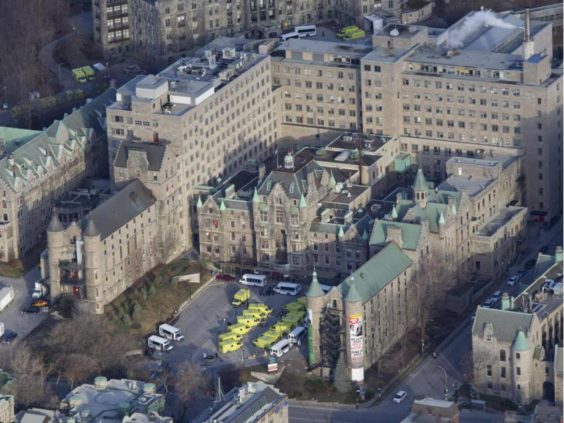 Ten years for an ‘opportunity study’ sounds a bit excessive. It took less than half that time to build Expo67!
Ten years for an ‘opportunity study’ sounds a bit excessive. It took less than half that time to build Expo67!
Quebec will give the Royal Victoria Hospital land to McGill University
The Quebec government is authorizing the university to renovate of the historic buildings located on the southeastern flank of Mount Royal.
(Montreal Gazette) While the province retained ownership of the old hospital, McGill outlined its vision in 2015 of gutting the 120-year-old institution, preserving its heritage buildings but tearing down other buildings to create structures housing classes, research facilities and administrative offices. The plans call for the opening of public pathways to Mount Royal, turning parking lots into green spaces and building a 2,000-seat convocation hall/atrium that could be used by the community.
Over the next 10 years, the university will put together an opportunity study for the use of the site, and the Quebec government will contribute $37 million to that study. The government will also chip in an additional $5 million so the university can draw up plans for the project.
21 May
A Montreal Publisher’s Coffee Shop Becomes a Cultural Gathering Place
… the publishing house offers to organize book launches in the café for all its authors. “We sell the books and well-priced wine and snacks, the authors don’t have too much to worry about, their friends and family discover the place, and it’s open to our regular customers. It’s a win-win-win situation.”
The list of regular events and meetings that take place in the café is also growing. “We welcome book clubs, creative writing workshops, and we’re about to launch a monthly storytelling morning for families,” Fortin told us.
And every Wednesday, an academic group called Thèsez-vous? organizes a thesis-writing workshop for graduate students at the café. Chez l’Éditeur has also hosted film shoots, podcast recording sessions, movie screenings, poetry nights, and book launches.
17 May
Clash over clamour from Parc Jean-Drapeau may soon be resolved
Montreal, Saint-Lambert agree to set a cap on how loud concerts can be
(CBC) The city is building a new amphitheatre on Île Sainte-Hélène which will hold 65,000 concert goers.
The stage is supposed to face the South Shore, which is still a point of contention between the two sides.
14 May
Montreal is trying to fix its decrepit water system. It won’t be easy
Many pipes date back to the early 1900s, leaks and breaks a major problem
(CBC) With more than 7,000 kilometres of pipes and sewers across the island, Montreal’s underground sewer system is one of the largest in Canada.
At least a third of pipes, though, have reached the end of their lifespan and another third will by 2020.
For years, the city has been trying to tackle the problem, but the Plante administration has stressed urgency and made replacing the aging water infrastructure a priority.
The city increased the water tax for homeowners in last year’s budget to help pay for the improvements.
A pipe dating back to 1895 was found during work on Laurier Avenue
5 May
Josh Freed: Projet Montréal’s duty to consult is being usurped by its anti-car agenda
There’s just one month to go before we lose a Montreal summer experience we’ve all grown up with: driving over the mountain.
Many hundreds have written or approached me to complain, more than any issue I recall in decades.
I even have a way the city could keep their plan while respecting Montrealers’ wishes. They just have to change one digit, from June 2018 to June 2019.
After consulting — not before.
2 May
Cemetery administrators oppose plans to block through traffic on mountain
(CJAD) Administrators of the Notre-Dame-des-Neiges and Mount Royal cemeteries say under the plan, day-to-day visitors will have a hard time accessing the main gates on their grounds — the main entrance for the Mount Royal cemetery, in fact, is right where Camillien-Houde Way and Remembrance Rd. meet.
The other entrance is from a dead-end street in Outremont and is not very visible.
Mayor Valerie Plante says visitors would be able to use a bus stop near the main entrance, or drive to other cemetery gates, but officials at both grounds say those who visit their loved ones on a daily basis can’t walk very far, and nor can they take public transportation.
27 April
Montreal offers details on its plan to stop cars over Mount Royal (with video)
(CTV) Montreal will go ahead with its pilot project to ban most vehicles from crossing over Mount Royal as of June 2.
Mayor Valerie Plante announced the details of the project Friday afternoon – a project controversial enough that it spurred a petition and outcry from local residents.
26 April
Short stretch of Ste. Catherine St. to lose one lane of car traffic
(CTV) Valerie Plante’s administration is going to limit car traffic to one lane for a seven-block stretch of the street, between Mansfield St. and Bleury St.
The right hand lane would be reserved for deliveries, and 144 parking spots along that section will also be eliminated.
See also Gripes
19 April
Months after imposing tax hikes, City of Montreal declares budget surplus
City unexpectedly has an extra $140M in its coffers, annual financial report shows
(CBC) After raising taxes at the beginning of the year to make up for what was then described as a “huge” budget shortfall, the Plante administration now finds itself with extra money in the city’s coffers: a surplus of $139.5 million.
The findings came in the 2017 financial report, which was tabled by the administration Thursday afternoon.
(9 November 2017 Montreal mayor-elect Valérie Plante says Coderre left ‘huge’ budget shortfall)
The report states that unexpected additional revenues of $313.6 million are one of the main reasons for the surplus.
20 March
Going, Going, Gone
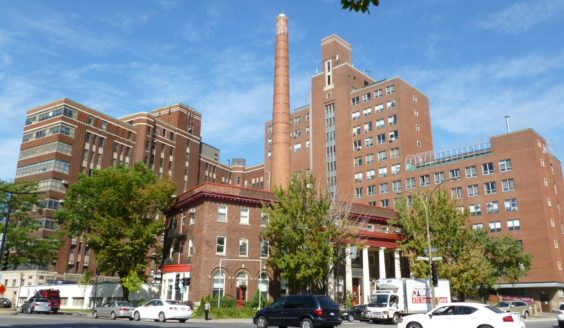 Montreal’s old Children’s Hospital is among the most iconic buildings in the Western end of downtown Montreal. Just a stone’s throw away from the old Forum, it dominates the skyline with its massive chimney and imposing red brick walls. It moved to its last location on Tupper in 1956, and operated continuously through expansions and mergers with other hospitals until May 24, 2015, when its remaining 68 patients were successfully transferred to the MUHC’s new Glen campus on Décarie.
Montreal’s old Children’s Hospital is among the most iconic buildings in the Western end of downtown Montreal. Just a stone’s throw away from the old Forum, it dominates the skyline with its massive chimney and imposing red brick walls. It moved to its last location on Tupper in 1956, and operated continuously through expansions and mergers with other hospitals until May 24, 2015, when its remaining 68 patients were successfully transferred to the MUHC’s new Glen campus on Décarie.
20 March
Montreal Children’s Hospital tower comes down in a cloud of dust
After initial predictions it would come down between 1 p.m. and 2 p.m., it finally came down at around 4:20 p.m.
13 March
Not our idea of public consultation.
Public will get say before Mount Royal traffic changes, but project is a go: Plante
Mayor adamant hearings are not to decide ‘whether or not there will be a pilot (project) — there will be one’
5 March
In Montreal, a Berlin Wall of the Mind?
By DAN BILEFSKY
(NYT) On one side of a grand square near the old Port of Montreal is a sculpture of a Frenchwoman in a Chanel suit, clasping a poodle and sneering at the Bank of Montreal, a former symbol of British colonial rule built in 1847.
On the opposite end, a dapper Englishman, cast in bronze, holds a pug and stares condescendingly at Notre-Dame Basilica, an emblem of French Quebec’s influence under the Roman Catholic Church.
The poodle and the pug stare longingly at each other.
The sculptures are a powerful metaphor for this city, which has long been polarized by what the celebrated Canadian novelist Hugh MacLennan called the “Two Solitudes” — the perception, fairly or not, that French- and English-speaking Quebecers coexist uneasily.
26 February
Denise Bombardier: Les vélos et les vieux
(Journal de Montréal) J’habite Le Plateau-Mont-Royal, le paradis des fous de la pédale. Mon maire, Luc Ferrandez, est un fondamentaliste du vélo. Il roule même à vélo, main dans la main avec la mairesse de Montréal, Valérie Plante, elle-même une prosélyte de la bicyclette.
Si les vieux doivent s’encabaner faute de pouvoir circuler à vélo ou dans les transports en commun – essayez de faire des courses d’épicerie en métro ou en bus –, il serait peut-être mieux de les faire disparaître ou d’aller les conduire sur le Mont-Royal à mi-sommet, désormais, avec la nouvelle loi de sœur Sourire et du pape Ferrandez. Ils seront ainsi plus près du cimetière. Cela évitera de faire circuler les corbillards polluants dans les rues de la métropole.
21 February
100 days of Valérie Plante: Time for a reckoning
Montreal’s mayor rode an ambitious, promise-filled campaign into city hall. How much progress has she made?
20 February
Civil engineers at Concordia University devise a cost-saving solution for cities
The framework allows for coordination of road and water repairs
(Eureka Alert) Why fix a road today if it’s slated to be ripped up for new sewers next summer?
This kind of question is at the heart of research from Tarek Zayed, and Amin Hammad, professors in Concordia’s Department of Building, Civil and Environmental Engineering (BCEE), and PhD candidates Soliman A. Abu-Samra and Mahmoud Ahmed.
“Better coordination at city hall is the key to less costly repairs,” says Abu-Samra. “We’ve shown that streamlining maintenance results in huge financial and time savings.”
Their findings were recently published in the Journal of Construction Engineering and Management.
“Canada is experiencing an enormous infrastructure deficit that was estimated at $123 billion in 2007 and is increasing by about $2 billion annually,” says Abu-Samra. “Thus, there is a need for more efficient use of municipalities’ budgets to enhance the level of service delivered to taxpayers.”
Dan Delmar: The ‘Plateau-ization’ of Montreal is underway
Among the challenges Mayor Valérie Plante has ahead of her is reining in her party’s base and evangelical wing, led by Luc Ferrandez.
…the Plateau evangelist isn’t being sidelined in government as the executive committee member in charge of greenspaces and “Grands Projets.” He’s already caused an uproar in announcing a plan to prohibit through traffic over the mountain, along Camillien-Houde Way, a plan that would make travel between east and west ends even more maddening.
The plan is a logistical nightmare, its quick rollout feels like a hasty overreaction to a recent cycling death, and it exemplifies the kind of vexing scenario many Montrealers feared with ardent environmentalists at the helm.
Despite the political liability, at least some of the Ferrandez doctrine is being adopted by Plante (which hasn’t prevented Ferrandez from publicly undermining his mayor, recently describing part of her election strategy as “amateurism”).
Already under fire for property tax hikes, inevitable as they might have been, the Plante administration will also push the green envelope by increasing fines for driving and parking infractions; rolling stops will be permitted for cyclists; and the Ste-Catherine St. revitalization, it’s safe to assume, will slash parking space in the downtown core.
There are of course plenty of political successes in the Ferrandez-led Plateau, including the addition of green spaces, safer intersections and community markets. But the Plateau is also by far Montreal’s densest borough, and its policies don’t necessarily fit neighbouring communities, making fears of the Plateau-ization of Montreal fairly rational.
16 February
Editorial: City should listen to opponents of Mount Royal traffic plan
It seems it might be easier to move mountains than to move Luc Ferrandez away from his plan to prevent cars from crossing Mount Royal
25 January
Allison Hanes: Bitterness from Montreal’s botched budget will linger
Valérie Plante’s first promise-breaking budget and lousy communication strategy will complicate her ability to enact her agenda.
(Montreal Gazette) Homeowners are upset over a 3.3-per-cent hike in their property, borough and water taxes and business owners are furious about a 3.0-per-cent jump in their combined taxes — both over the inflation rate Plante vowed to peg any increases to. And mayors from neighbouring municipalities are up in arms over a 5.3-per-cent rise in their contribution to the city for shared services — a bump they claim they were never forewarned about.
The additional 1.1-per-cent increase in the water tax that must be factored in came out of left field. Plante is trying to sell it as a necessary investment in crumbling infrastructure that will save money for future generations after years of neglect. But significant work is already taking place on addressing this backlog.
The city spent more than $300 million last year on water main replacements, a not insignificant amount. Plante wants to up that amount to $500 million. Why did ramping up this work become so urgent since her arrival in office? Why didn’t she campaign on the need to ask Montrealers for more if it is so essential?
2017
Montreal Blog 375th anniversary
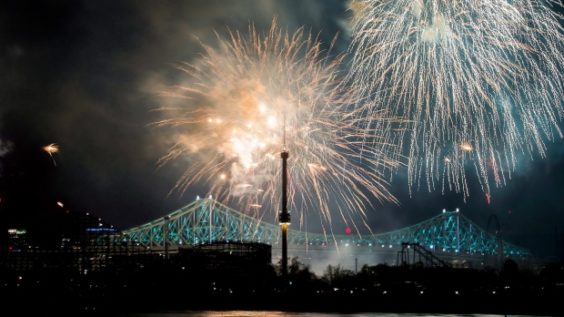 (Graham Hughes/The Associated Press)
(Graham Hughes/The Associated Press)
Fête or flop? Looking back on Montreal’s year-long birthday party
$125M events budget was meant to lift Montrealers’ spirits, and many were satisfied, says oragnizer
Montreal turned 375 in May, and in honour of our fair city’s anniversary, more than 200 events were held over the course of the year to mark the occasion.
For some, it was a year to celebrate. For others, it was a year to criticize the cost of those celebrations.
Alain Gignac, one of the organizers of those celebrations, said he felt the atmosphere in the city had become kind of grim over the last few years, and a big bash was in order.
… many questioned the large-scale festivities, wondering why we were celebrating a seemingly random milestone, chalking it up to a Denis Coderre vanity project in an election year.
… Most people may remember the biggest events because they were the flashiest — the lighting of the Jacques Cartier Bridge and the giant marionettes that paraded through the city in May, for example — but mainly, Gignac believes Montrealers will remember that for a year, the city was abuzz.
So, what did Montreal’s 375th celebrations really do for the social fabric of the city?
3 Montrealers weigh in on the legacy of the year-long bash
Montreal’s year-long birthday extravaganza is almost over. One more blow-out event on New Year’s Eve and the memory of the whole thing might possibly fizzle away with bubbly.
Many seem bent on remembering the festivities simply as “The Denis Coderre Variety Show that cost $1 billion of taxpayers money.”
29 December
Montreal is Canada’s most trilingual city, census reveals
StatsCan figures indicate more than 21 per cent of Montrealers can speak at least three languages
Quebec made international headlines when its legislature voted 111-0 in November in favour of a motion calling on store clerks to greet customers with a “Bonjour” instead of the English-French mix, “Bonjour/Hi.”
The reality on the ground in Montreal, however, is that customers to the city’s stores and restaurants would likely be just as comfortable with an Hola, Ciao, Namaste, Salaam or Marhaba.
21 December
This is such sad news. So many good memories and of course, best of all, the Wednesday Night #1500 celebration (See Wednesday Night #1500 – Diana’s Report)
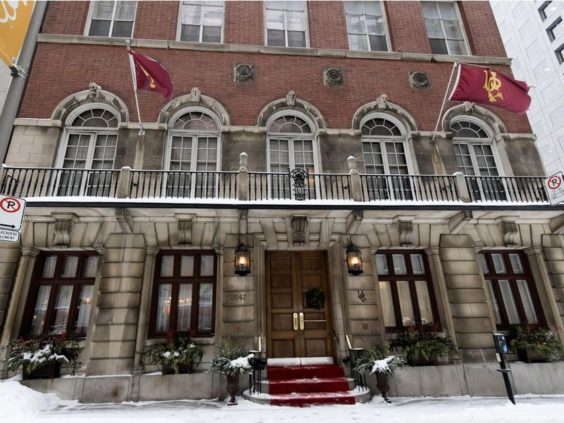 Photo: Allen McInnis / Montreal Gazette
Photo: Allen McInnis / Montreal Gazette
University Club of Montreal giving up its Percy Nobbs-designed downtown digs
(Montreal Gazette) The University Club of Montreal is selling its Mansfield St. clubhouse, a gracious limestone and brick building that has housed the private club since it was built in 1913 — six years after it was founded as a place for men with university degrees to gather. It was designed by Percy Erskine Nobbs, an influential architect trained in the Arts and Crafts movement and known for exquisitely crafted buildings designed on an intimate, human scale.
The clubhouse was classified by the Quebec government in 1986 as a historical monument, which means that the exterior as well as much of its interior is protected by the Loi sur le patrimoine culturel as a heritage space and no modifications can be made without approval by the ministry of culture and communications.
Membership in the club is stable at about 700, so that is not the issue. But money is. The building “requires major renovations,” according to a notice on the club’s website, and “the cost of maintaining it is just too high now,” club president Gabriel Zaurrini said this week.
Members learned at a special meeting in mid-September that the clubhouse would be sold and the mandate for the sale has been given to the CBRE real-estate firm. Several letters of intent, which are not offers but preludes to offers, have been received.
“Interest is high,” Zaurrini said on Thursday.
It is hoped that a decision about a buyer will be made by the end of the first quarter of 2018.
Meanwhile, the clubhouse will close at the end of December; the art and the furnishings of value will go into storage. The club will relocate for 2018 to the Saint James Club on Union Ave. While no decisions about its eventual location are to be made before the building is sold, Zaurrini said options include buying a smaller place, renting or the possibility of merging with another private club.
8 December
Montreal’s plastic bag ban goes into effect Jan. 1
Individuals and companies face plastic-bag fines that could hit $4,000 for repeated offences
… while the city’s website says it won’t be enforced until June 5, the ban is backed up by a schedule of fines targeting individuals and companies.
Individuals continuing to provide plastic bags in stores face fines ranging from $200 to $1,000 for a first offence and $300 to $2,000 for a subsequent offence.
Companies found in violation of the bylaw face fines of $400 to $2,000 for a first offence and $500 to $4,000 for a subsequent offence.
The ban applies to plastic bags, conventional plastic shopping bags (less than 50 microns, about the thickness of a conventional black garbage bag), as well as oxo-degradable, oxo-fragmentable and biodegradable shopping bags, whatever their thickness.
2 December
‘This is a major discovery’: Explorers find massive ice-age cavern beneath Montreal
Cathedral-like chamber, formed more than 15,000 years ago, features underground lake
(CBC) Explorers have just discovered a new underground passage, complete with stalactites and a lake, all buried beneath the city of Montreal — and they don’t know where it ends yet.
Until a couple of months ago, no one had ever set foot inside.
The spectacular find is connected to Montreal’s Saint-Léonard Cavern, which lies underneath Parc Pie XII, not far from Highway 40.
The main portion of the cavern has been open to members of the public for decades, but tour guides had no idea there had been a massive section hidden behind a limestone wall.
The passageway, formed more than 15,000 years ago during the last ice age, runs at least 200 metres long, six metres high, and about three metres wide.
6 November
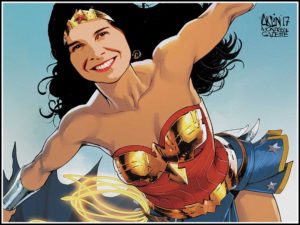 Montreal election results: Two-way race became a referendum on Coderre’s personality
Montreal election results: Two-way race became a referendum on Coderre’s personality
(Gazette) The voting results that saw Valérie Plante elected as Montreal’s first female mayor appeared to be just as much a repudiation of incumbent Denis Coderre and his Équipe Denis Coderre pour Montréal party.
Comment from a Facebook friend: “Thoughts on the Montreal & Westmount elections: The male candidates who went down to defeat all spent far too much time telling us how bloody wonderful they are. Sure, you have to inform the electorate about your qualifications and achievements, but smugness and palpable entitlement don’t play well.
Gender played a role, but I think (relative) youth was more important. Old white men who’ve been doing things the same way for decades have had their chance.
A young black man got elected in Westmount, and that should puncture a few stereotypes about who lives here, too. The Rhodesians have embraced the new now.”
5 November
It was a real horse race and the filly won.
Valérie Plante will be next mayor of Montreal, beating out Denis Coderre
‘We’ve made history,’ says leader of Projet Montréal, as Coderre concedes, announcing he’s quitting [municipal politics]
Are you registered? To vote Nov. 5, you must be on electoral list by Tuesday
On Nov. 5, some Montrealers will cast two ballots, others up to five.
Valérie Plante
4 November
Election issues: Montrealers face duelling visions of democracy
Leading up to municipal elections on Nov. 5, we look at influential factors in the Montreal race. Here: democracy and citizen participation
For some, citizens’ input begins and ends with choosing a mayor and council every four years — and many do not seem interested even in that. Only 43 per cent of eligible voters cast ballots in the 2013 municipal election.
But increasingly, it seems, residents are also demanding to be informed and consulted between elections on issues that affect them, whether it’s a highrise that could block their view, a green space threatened by development or a major project that could raise their tax bill.
Clashing visions of democracy are among the sharpest contrasts between the two main contenders in Sunday’s election — from Bill 122, which strips citizens of the right to demand local referendums, to whether voters should have a say on projects like the baseball stadium, Formula E race or new amphitheatre in Jean-Drapeau Park. …
Bill 122, passed by the National Assembly in June, removes a democratic safeguard by eliminating the right of citizens to force referendums on real-estate projects, Junca-Adenot says.
To compensate, municipalities must hold some form of consultation. …
“Without referendums, citizens have lost a safeguard.”
“It forced developers to discuss with citizens. It gave citizens bargaining power. If you have no power, why would people negotiate with you? The referendum provided a system of checks and balances between citizens, developers and cities.”
Unknown no more, mayoral hopeful Valérie Plante senses wave of support
The woman who would be Montreal’s first female mayor says she feels a wave of support as she winds up her campaign, but will it be enough?
On her last day of active campaigning Saturday, Plante dropped into several of Montreal’s most popular public markets to urge Montealers to vote, and was welcomed by an enthusiastic public that seemed to know exactly who she is.
At Atwater Market yesterday afternoon, several shoppers made a bee-line for the woman in the red coat who recent polls indicate has an even chance of unseating incumbent Denis Coderre on Sunday.
Since the publication of polls showing the race had tightened up, Coderre and his team have changed their tone, attacking Plante as a neophyte and warning this is not the time to switch leaders while Montreal is doing so well. Members of Coderre’s team warned Friday following through on only seven of Plante’s promises would cost $800 million and necessitate a three per cent tax hike.
But Plante said Coderre is panicking and throwing out numbers wildly to frighten voters. He is the one who has been playing fast and free with Montrealers’ tax dollars, she said, by refusing to reveal how much he would spend on his promises, such as a new baseball stadium.
Plante has said she will stay on as leader of the opposition if she loses the mayoral race. When she put that question to Coderre during one of their debates, he sidestepped, saying he was going to win. Plante said she asked that question to show she is committed to working for Montreal either way, and to imply Coderre’s commitment is not so clear.
 ‘If it ain’t broke’: Coderre boasts of record on campaign’s last day
‘If it ain’t broke’: Coderre boasts of record on campaign’s last day
“The return of the Expos is closely linked to your humble servant,” Coderre said.
“We cannot afford to start from scratch,” Coderre said Saturday in a park across from city hall, accusing his opponent, Valérie Plante of Projet Montréal, of making “474 promises that have no chance of being kept.”
Surrounded by candidates for his Équipe Denis Coderre, the incumbent mayor boasted of ending corruption, repairing infrastructure, fighting homelessness and building bridges with indigenous peoples by including them in the city’s flag.
He also portrayed himself as a team-builder — in contrast to the start of his campaign, which had focused almost exclusively on Coderre himself, right down to the name of his party.
Coderre also said that his decades of political experience mean he has a direct link to decision-makers in Ottawa and Quebec City.
While Coderre appeared to avoid the spotlight Friday, he denied that he was worried by polls showing himself and Plante neck-and-neck.
15 October
Montreal election: Projet Montréal wants to deploy cleanliness brigades in every borough
The brigades are appreciated by the residents and shopkeepers of the streets where they work since the cleanliness there is significantly improved, said Plante, adding her party will increase the budget for the brigade, as well as the quantity and quality of garbage cans on commercial streets and public spaces
12 October
 Projet Montréal’s Pink line: Pipe dream or election game-changer?
Projet Montréal’s Pink line: Pipe dream or election game-changer?
A closer look at just how realistic is Valérie Plante’s plan to build a new Metro line
(CBC) Denis Coderre … abruptly dismissed the idea of building a new Metro line that would cut diagonally across the city and consist of 29 stations.
However, engineering and public policy experts consulted by CBC News offer a more nuanced analysis of the proposal to build a 29-kilometre Metro line from Montreal North to Lachine.
On the one hand, they acknowledge the line meets a need, and financing is available. On the other hand, they believe Projet’s estimated price-tag of $6 billion and its six-year timeline might be overly optimistic.
The Pink line, as it’s currently sketched out, is designed to travel through some of the densest neighbourhoods in the city, giving them more rapid access to the downtown core.
Normally that would give rise to concerns about disruption to businesses and residents during construction. But Projet’s proposal banks on new engineering technology — a tunnel-boring machine — that digs pathways deep underground.
Madrid and Barcelona have used TBMs to complete projects in less time and for less money than Projet has budgeted for the Pink line. But using European models ignores the different culture and context of infrastructure construction in Canada.
The Gazette has a much more negative view
How does Projet Montréal’s $5.9B Pink Line compare to other métros? – Putting the Pink Line proposal into a global cost context
7 October
Montreal election: The two sides of Denis Coderre
A straight-shooter who gets things done, or a controlling and power-hungry egoist? A closer look at the incumbent mayor of Montreal
Coderre is riding a wave of positive news in a city long resigned to hearing the opposite.
Unemployment is historically low, tourism records are being set and the New York Times and Wall Street Journal are writing about Montreal’s booming luxury-residence market. Coderre adds as well that municipal corruption headlines that dominated the news cycle before his arrival at city hall have largely quieted.
Coderre lists as his administration’s main accomplishments heavy spending on infrastructure, the coming light-rail system, the creation of the corruption-busting inspector general’s department, and increased metropolitan-status powers won from Quebec he says will allow for things like more social housing and subsidies for small businesses crippled by the city’s road construction.
Tempering his get-it-done reputation, however, are mounting concerns about his style. He’s overly controlling, critics say, and acts impetuously without sufficient consultation.
This has drawn flak for some high-profile pricey projects associated with Montreal’s 375th birthday celebrations, including the federally subsidized $39.5-million lighting of the Jacques Cartier Bridge.
27 September
Montreal elections: The real ‘winner’ in this poll is indecision
Montreal mayoral candidates Denis Coderre and Valérie Plante are running neck and neck among decided voters, a Mainstreet/Qc125 survey suggests.
41 per cent of respondents saying they have yet to make up their mind over who will get their vote in the Nov. 5 municipal election.
The survey of 500 respondents conducted Sept. 20-22 found that incumbent Coderre had the support of 30 per cent of decided voters while Plante of Projet Montréal polled at 25 per cent. Jean Fortier, who is running for Coalition Montréal, polled at three per cent.
25 September
Konrad Yakabuski: Montreal’s mayor loves his job – a little too much
(Globe & Mail) It’s like he’s on the power trip he’s dreamed of all his life, throwing his weight around like he owns the place. If Denis – and everyone calls him Denis – thinks there’s political mileage to be squeezed out of taking on Canada Post, there is no rule of decorum or law that is going to stop him. We learned that when the mayor took a jackhammer to the concrete slab that was to serve as the base for a super mailbox and proceeded to pound it into smithereens.
If the mayor thinks he can boost his green credentials by having the city host an electric-car race, then nothing is going to stop him from opening the municipal spigots and fencing off entire kilometres of downtown Montreal for nearly a month in midsummer without consulting the residents, businesses or commuters inconvenienced by this electric headache.
City Hall has run fairly smoothly, by Montreal standards, under Mr. Coderre. But executive committee chair Pierre Desrochers, not the mayor, has been mainly responsible for budgetary and operational matters in the Coderre administration. He’s not running for re-election, so Mr. Coderre will need to find a new manager at least as competent to oversee day-to-day operations.
23 September
Analysis: Stage set for scrappy Montreal municipal election
Strap yourself in, Montreal, and get ready for a bumpy ride to Nov. 5.
Like roadwork and traffic deviations, the municipal election battle now underway promises to be messy and loud.
Posters went up on Friday as official election campaigns kicked off in municipalities across Quebec — and the one in Montreal is shaping up to be a grudge match between Denis Coderre and Valérie Plante.
Or, to be more specific, between Coderre and Projet Montréal, the party Plante leads.
Politicians are a combative lot, but two-way election races — which crop up infrequently in Montreal electoral history — tend to get bare-knuckled and acrimonious. …
Enter Projet Montréal, the official opposition on city council and Coderre’s nemesis during the past four years.
Contrary to Équipe Denis Coderre, Projet Montréal has name recognition, statutes and a program, but a relatively unknown mayoral candidate in Plante, who aims to become Montreal’s first female mayor.
She couldn’t be more different than her rival.
While Coderre is a career politician from the suburban borough of Montreal North, Plante is a downtown resident and a relative newcomer to politics. A community organizer, she was first elected as city councillor in 2013. … Coderre is coming off the toughest year of his four-year term, having to fend off controversies surrounding his pit bull ban, the Formula E race, granite tree stumps as a 375th anniversary gift to the city and revelations that he phoned the police chief to sniff out the background of a nosy journalist.
21 September
Montreal gets metropolis status, with more powers and autonomy
(Montreal Gazette) MNAs in the legislature gave their final approval to Bill 121 which — among other things — declares Montreal the province’s metropolis.
On a symbolic level, the bill is significant because it grants Montreal the status of the province’s “metropolis.”
On a more concrete level, the city gets sweeping new powers, the kind the island’s politicians have craved for years. Besides control over bar and store hours, there’s more power to manage housing, health, the homeless and the integration of immigrants.
The city can crack down faster on the owners of crumbling or unsanitary buildings and directly compensate the owners of businesses who suffer revenue losses because of never-ending infrastructure projects.
Montreal now can launch a corporation to manage parking and set up a network of charging stations for electric cars, Municipal Affairs Minister Martin Coiteux said, describing the passing of the law as a “historic day for the city and Quebec.”
The government has already created special legislation tailored to fit the provincial capital and another for other cities in the province.
15 September
Facebook to open AI lab in Montreal headed by McGill professor
This is the first time Facebook has invested in artificial intelligence research in Canada.
Facebook has opened an artificial intelligence research lab in Montreal, the company said on Friday.
The lab will be headed by Joëlle Pineau, a McGill University professor.
This will be Facebook’s fourth artificial intelligence research lab, after Menlo Park, Calif.; New York; and Paris. This is the first time Facebook has invested in artificial intelligence research in Canada, it said. Facebook’s AI research labs employ around 110 scientists and engineers.
The lab, which has opened, is expected to employ 10 researchers by the end of the month, and the company said it plans to grow that number to 30 people within a year. The company said it eventually plans to invest more than $7 million in the lab.
Yann LeCun, Facebook’s chief AI scientist, said the company was attracted to Montreal by the city’s strong talent pool in artificial intelligence.
Pineau will keep her post at the university, splitting her time between the two.
13 September
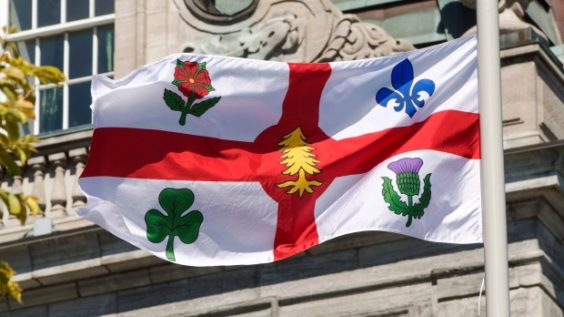
Montreal adds Iroquois symbol to flag, strips British general of street name
New flag represents hope ‘connection to this territory is finally acknowledged,’ Quebec chief says
(CBC) Mayor Denis Coderre unveiled the new flag, which features a white pine tree at its centre, on Wednesday alongside Ghislain Picard, chief of the Assembly of First Nations for Quebec and Labrador.
The announcement was made on the 10th anniversary of the United Nations Declaration on the Rights of Indigenous Peoples.
City adds First Nations symbol to flag, to rename street as part of reconciliation plan
Montreal has added a symbol representing First Nations to its flag, Coderre has vowed to rename a street that commemorates an 18th-century British general who advocated the use biological warfare.
On Wednesday, the city added a symbol representing First Nations — a white pine — to its flag and coat of arms, and announced it will rename a street commemorating British general Jeffrey Amherst, who advocated the use of smallpox-infected blankets as a weapon against Indigenous Peoples.
Mayor Denis Coderre said the changes are part of the city’s reconciliation plan.
Montreal’s flag and coat of arms now include five emblems: a white pine (representing the original Indigenous presence in Montreal), along with symbols representing the French (fleur-de-lis), the English (rose), the Scottish (thistle) and the Irish (clover).
Allison Hanes: New Montreal flag is symbolic, but important, gesture
Montreal’s new flag and other gestures are a good starting point, but for true reconciliation, we must address the misdeeds, injustices and atrocities still taking place
6 September
Bonaventure Expressway makeover includes new park, art and walkways
New urban boulevard including 9 ground-level lanes replaces old expressway
(CBC) The City of Montreal has officially unveiled a new look for the stretch of road leading into the Bonaventure Expressway, including green space, walkways and a work of art.
The esthetic overhaul is part of the city’s $140-million project announced in 2014 to replace a stretch of the expressway and turn it into an urban boulevard in time for Montreal’s 375th anniversary.
Montreal Mayor Denis Coderre called the new configuration a “major transport route that is modern, durable and well-integrated in the urban milieu” at the inauguration on Wednesday.
3 September
Would-be Montreal mayor Valérie Plante isn’t a household name. But she needs to be
It’s the getting to know her part that may prove Valérie Plante’s biggest hill to climb to topple Mayor Denis Coderre.
22 August
Powerful winds rip apart trees, smashing cars and blocking roads in Montreal
Hydro-Québec estimates around 48,700 customers without power in Montreal
A powerful storm that descended on Montreal, downing trees and blocking roads, has left thousands without power and many with damaged homes and cars.
Notre-Dame-de-Grâce and Saint-Henri were among the hardest hit areas, but there were reports of damage on the West Island and in Ahuntsic-Cartierville.
Amélie Bertrand of Environment Canada said it’s unlikely Montreal was hit by a tornado. There were, however, winds upwards of 110 kilometres an hour.
A microburst is a column of sinking air that can come down at speeds over 100 kilometres per hour. The damage it leaves behind is recognizable because it often appears to come from one direction.
 Beloved Notre Dame de Grâce Park devastated by strong winds
Beloved Notre Dame de Grâce Park devastated by strong winds
Dozens of trees, branches downed by strong winds during thunderstorm
Winds raging at more than 110 kilometres per hour took down dozens of trees in Notre Dame de Grâce Park Tuesday afternoon.
The park, located at the Girouard Avenue and Sherbrooke Street West, is locally known as Girouard Park and has a newly devoted section named Vimy Ridge Park.
28 July
CBC/Radio-Canada sells building for $42 million
The state-owned radio and television broadcaster said in a press release the price was decided after several adjustments were made.
The Crown corporation said in a news release the sale means it has freed itself of maintenance and reparation costs equivalent to $170 million.
Construction work on the current building will only begin once CBC/Radio-Canada has moved in 2020 to its new location on René-Lévesque Blvd. and Papineau Ave.
In a separate transaction, CBC/Radio-Canada is ceding the eastern portion of its lot to the Broccolini group, which was chosen last year to build CBC/Radio-Canada’s new headquarters the Crown corporation will rent.
Formula E: Making Montreal great again or the mayor’s Waterloo?
(CBC) In his fevered insistence on hosting an electric car race, Coderre is testing his reserve of political capital
Contrary to expert opinion, he claims the race will help turn Montrealers on to electric cars. He has minimized the disruption to residents and businesses, and dismissed his critics as enemies of progress.
At times Coderre can sound like that other bombastic politician whose promises don’t always align with reality. “If we stopped events whenever there are critics, Expo 67 would never have been held.”
… It is now impossible to separate Drapeau’s legacy from the Olympic fiasco. Formula E could cleave to Coderre in the same way.
By itself, the race won’t be the mayor’s Waterloo. But it risks becoming emblematic for voters of all the troublesome aspects of his four years in office.
It recalls the administration’s tendency to develop policy on the fly, to bluster past opposition, to sacrifice mundane considerations for grandiose visions.
18 July
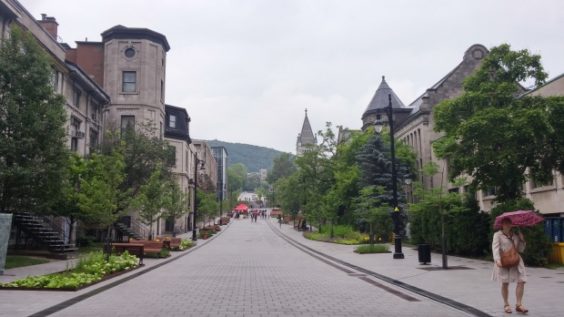
Allison Hanes: Pedestrian corridor is beautiful, but expensive
Under an overcast sky and through periodic rainfall, one of the most hyped legacy projects for Montreal’s 375th anniversary was unveiled Monday with jazz music, a bubble machine and back-slapping.
The 3.8-kilometre walkway has been billed as a transformative concept that will link the city’s main natural assets, passing historic sites and various famous landmarks along the way.
But let’s not kid ourselves. The route being vaunted already existed. Starting near Pointe-à-Callière, it goes past Place Youville, sends people up McGill St. to Square Victoria, then directs them up Beaver Hall Hill to Phillips Square. With new trees, fresh planters, pixellated crosswalks that echo the pattern of the brick work farther along, special signage and altitude markers, this lower portion of the Fleuve-Montagne has benefited from minor improvements. But printing up maps to point out some of Montreal’s finest features would have achieved similar results at far less cost.
The ascent is beautiful and dramatic. But it seems the bulk of the effort was focused on less than a kilometre of the promenade — and a part that was already a quasi-pedestrian area to begin with. This changes the cost-benefit analysis significantly for Montrealers.
28 June – 8 July
Montreal International Jazz Festival 2017: Irwin Block’s picks
Here are my picks for the most promising shows at this summer’s Montreal International Jazz Festival. Choices focus on what qualifies as jazz.
Some great shows and note the sizeable presence of Cuban artists
Program
1 July
Montrealers celebrate Canada 150 with rain-soaked parade
The emphasis on diversity and inclusivity was apparent, with the damp air filled with cymbals giving rhythm to Chinese dancers and the eventual sound of bagpipes making their way down Ste-Catherine St. The Bangladesh Solidarity group, Aklan Association of Montreal, a group that represents the Philippine community, the Jamaican Association of Montreal and Les Éclairs du Québec were but a few of the groups marching down the parade.
15 June
Trudeau backs Montreal’s ‘ambitious’ light-rail project
Ottawa commits $1.28-billion to electric rail system connecting downtown to suburbs, airport
Prime Minister Justin Trudeau says his government’s $1.28-billion investment in Montreal’s light-rail system will ease the burden on commuters and contribute to the fight against climate change.
The electric-rail project, which is led by the Caisse de dépôt et placement du Québec and also has funding from the Quebec government, will link Montreal’s downtown to its suburbs and international airport.
Trudeau confirmed his government will fund the “ambitious” plan, known by its French acronym REM, on Thursday at Montreal’s Central Station.
The price tag for the 67-kilometre rail line, which would link downtown with the South Shore and the West Island, has risen to $6 billion in order to add more stations in the city’s downtown area.
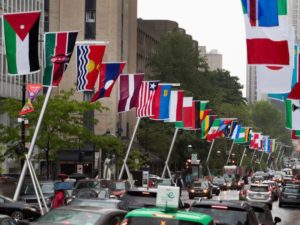 5 June
5 June
New art exhibition celebrates anniversaries of Montreal and Canada
A new outdoor art exhibition opened Monday along Sherbrooke St. as part of Montreal’s 375th anniversary celebrations.
The exhibition, entitled La Balade pour la Paix: An Open-Air Museum, features 67 stations – 30 sculptures and 42 photographs – by Canadian and international artists along its route.
The route is lined with the flags of close to 200 member countries of the United Nations, along with those of Canada’s 13 provinces and territories.
The exhibition is designed and organized by the Montreal Museum of Fine Arts, with the support of McGill University. It links together Concordia University and the MMFA at one end, and McGill University and the McCord Museum at the other.
31 May
Consultation office green-lights Montreal Children’s Hospital condos
The $400-million project to raze and build over the old Montreal Children’s Hospital site reached a crucial milestone Wednesday as the city’s public consultation office praised the development’s “innovative” potential.
But the Office de consultation publique de Montréal cautioned that the condo development needs to scale back its size, increase green space and prioritize social housing for it to be deemed acceptable by west-downtown residents.
30 May
Céline Cooper: Meet Montréal’s New Wave of Activist Developers
Collaborative upstarts are bringing Montréalers together in new ways, fueling neighborhood renewal and an influential political movement.
20 May
Josh Freed: Bonne fête, Montreal (and don’t look a gift bridge in the bill)
No matter where we’re headed, all roads lead to Rue Barrée.
As I look ahead into the future to your 400th birthday, what do I wish for you, apart from another party? I hope:
That you’re still a booming French-speaking metropolis, with a thriving anglo and allo community that’s added even more exotic festivals.
That your infrastructure has been modernized, with roads that gleam because of newly invented self-filling potholes, while Ste-Catherine St.’s heated sidewalks have spread through all downtown in winter.
That your superhospitals have become super, not sickly, and your universities are filled with brilliant foreign professors and others who fled here from England and the U.S. — during what’s remembered as the Brexit-Trump Catastrophe Era.
That your City Hall has gotten efficient, inventive and honest — with enough confidence to elect a hybrid Hindu-Scot-Caribbean-Hasidic-francophone-de-souche Mayor.
That you’ve become a city that works fabulously for pedestrians, cyclists, wheelchairs, buses and self-driving cabs and cars that fill your streets.
18 May
Montreal to stage another Jacques Cartier Bridge light show after police protesters crash party
Mayor Denis Coderre says 2nd show needed after off-duty officers barge in on bridge illumination spectacle
Coderre said it hasn’t yet been confirmed whether the second show would be the same as the first, or when it would take place.
He also didn’t venture an estimate of the cost of remounting the light show.
“What’s important is that everyone has a chance to enjoy it,” Coderre said.
The interactive lighting system, which can respond to the flow of traffic, weather and even social media mentions of Montreal, will illuminate the Jacques Cartier Bridge for at least the next 10 years.
Coderre called it Montreal’s new “signature,” comparing it to Expo 67, the Eiffel Tower in Paris and the Sydney Opera House in Sydney, Australia.
11 May
Kevin Tierney: Minorities invisible in Montreal’s 375th celebrations
(Montreal Gazette) I came across MTL, a 12-part documentary series that airs Thursdays at 8 p.m.
Its mission statement: “A history series to bring us all together based on the reality of today’s Montreal, its thousand realities, a quest: to decode the DNA of Montreal.”
This series is partially financed by the Société du 375e anniversaire de Montréal under the auspices of Gilbert Rozon, the founder of Just for Laughs, known here as the commissaire aux célébrations et président du comité de programmation — the very same committee that had to pull a celebratory ad from the airwaves in November because it was more or less the same as what this series looks like it will be: white and francophone, like no one else has ever lived or now lives here.
The worst part of the ad — which was subsequently “colourized” with visible minority faces — is not that it was made. No, it is that its intrinsic, fatal flaw was not noticed by any of the participants.
The writers, the committee, the actors, director, crew, post-production, the gamut of the creative team, apparently did not notice. Nor did anyone in a position of authority who signed off on it.
What this means, of course, is not that “they” necessarily dislike minorities — it is that they don’t even see minorities, that minorities do not exist. It is a horrible form of colour-blindness.
7 May
Montreal, Laval declare states of emergency over flooding
Bridge on Highway 20 closed between Île-Perrot and Montreal due to water accumulation
Transports Québec closes the Galipeault Bridge between Montreal and Île-Perrot
Montreal, Laval declare states of emergency
Rigaud orders evacuations
1,200 troops dispatched to help with flooding
3 dikes breached in Pierrefonds
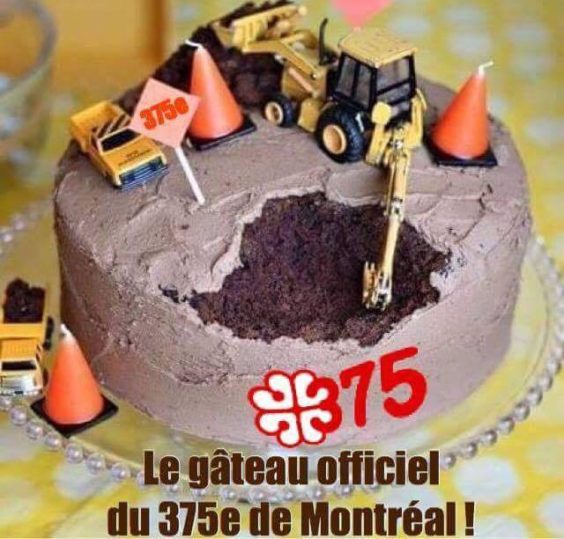
22 April
Projects for Montreal’s 375th will yield lasting benefits
By France Chrétien Desmarais & Monique F. Leroux, Special to Montreal Gazette
While it’s a festive occasion, the anniversary also presents a prime opportunity to develop and implement major socio-economic projects that will yield durable benefits for our community.
In 2010, extensive consultations by the City of Montreal sent a strong message: More than 2,000 participants agreed that Montreal should take advantage of this anniversary to boost our city’s competitiveness over the longer term.
In response, the Society for the Celebration of Montréal’s 375th Anniversary was born. In addition to its mandate to organize festivities to promote and celebrate Montreal, here and abroad, the society created a board of governors to identify and co-ordinate socio-economic projects for 2017 — and beyond.
To follow up on the report Pour une métropole prospère et inclusive pour un développement durable, the board of governors focused on eight socio-economic areas that are grouped into three key themes: youth and the next generation; leadership and innovation; and solidarity.
True to its guiding principle, “building bridges,” the board, which draws from 22 major Montreal institutions and businesses, is leading new collaborations among key partners.
Some of the projects are already underway, and others will begin over the next few years. The momentum is already in place.
These projects include: Design 375, a volunteer-based program to improve 25 schoolyards; the International Student MTL Passport, a cultural integration program to increase foreign-students retention; 375 Ideas, a new micro-credit fund for young entrepreneurs; the Maison de l’innovation sociale in collaboration with Amplifier Montréal, a program to identify our youth’s aspirations for Montreal; and to help food banks in Montreal, we’re looking at a project designed to extend food products’ shelf-life.
21 April
Not yet convinced this is such a great idea or worth $39.5-million
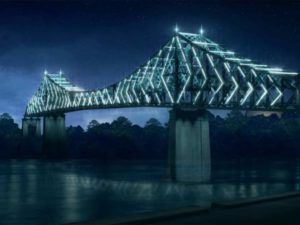 The Jacques-Cartier Bridge’s lighting design will turn it into an interactive public space
The Jacques-Cartier Bridge’s lighting design will turn it into an interactive public space
When the Jacques-Cartier Bridge turns on the lights in May 2017, … [i]n addition to its colour-changing, LED-based lighting design, the project will also use hues that reflect the seasons, the weather, or special events, while allowing the public to interact with and impact the fixtures via mobile devices.
The lighting of the Jacques-Cartier Bridge is part of Montreal’s 375th Anniversary celebrations. (See below, 3 January)
11 April
Martin Patriquin: Denis Coderre is a bad guy to cross
When it comes to payback, the mercurial Montreal mayor knows few limits
(iPolitics Insights) There is a flip side to this boisterous bonhomie, one which we’ve seen far more of in the last six months. This Coderre is paranoid, cynical, vindictive — and blessed with a bulletproof sense of entitlement.
Coderre can’t help himself, and sadly political conditions will only further enable his sense of infallibility. For one thing, his poll numbers have hardly budged since his election in 2013, remaining well within the 60 per cent approval sweet spot.
Coderre has the ability to dress up municipal politics — the stuff of garbage collection and snow removal — into something more grand. His Twitter feed is full of Expos regalia and speculation. Bringing back the team has become his unofficial campaign plank for the 2017 municipal election.
Successive mayors, from Pierre Bourque to the corrupted tragedy of Gérald Tremblay, have left Montrealers feeling cynical about their municipal leaders. With his outstretched hand and ready smile, Coderre has done much to erase this cynicism.
Like the very voters who put him there, Montreal is happily in his grip. Just remember not to struggle too much … because you don’t want Denis mad at you.
26 March
Montreal police chief submits plan for overhaul following scandals
Details are scarce, but mayor says it will address the culture of infighting
24 February
Quebec calls inquiry into ‘systemic’ problems in Montreal police service
Public security minister said inquiry will look examine how SPVM has handled internal investigations
Quebec’s public security minister is launching an inquiry into what he is calling “systemic” problems within the Montreal police service.
The police service has come under increasing scrutiny in recent days, amid allegation its internal affairs department fabricated evidence against whistleblowers.
20 February
Montreal becomes ‘sanctuary city’ after unanimous vote
Critics welcome gesture, but say city must go beyond words to help asylum seekers
The motion includes provisions to ensure undocumented people can obtain services without fear of deportation.
Mayor Denis Coderre said the move is more than symbolic and will help protect and assist the most vulnerable without compromising security.
The designation comes as the province is dealing with an increase in the number of asylum seekers crossing the border illegally from the United States.
14-16 February
Montreal replaces Paris as the best city in the world for students
(Lonely Planet) Montreal has knocked French capital out of the top spot in a ranking of the world’s best student cities. The Canadian city ended the Paris’ five-year run, according to the QS Best Student Cities ranking from higher-education analysts QS Quacquarelli Symonds. The ranking lists the top 100 urban student destinations around the world. According to a news release, Montreal’s success “is the latest of a series of propitious signs for a city beginning to escape a period of economic stagnation”, and notes that the city was recently named the world’s most intelligent city in the Intelligent Community Forum ranking.
Montreal is world’s #1 student city
(McGill Reporter) QS evaluated 125 cities to determine its Top 100 ranking. Each city was required to have a population of more than 250,000 and be home to at least two universities in the most recent annual QS World University Rankings. Three Montreal universities were in the 2016 rankings: McGill (number 30 in the world), Université de Montréal (126) and Concordia University (466).
Montreal’s improvement in the QS Best Student Cities ranking reflects gains in two of QS’s five traditional composite indicators – Affordability and Employer Activity – plus a strong performance in the new Student View category. The other three categories are University Rankings, Student Mix and Desirability. The breakdown of Montreal’s QS report card is available online.
12 February
Celine Cooper: Living by the Law of the North is a Canadian value
It is an unwritten rule, and you won’t find it codified anywhere in formal legalese. But if you live in this country — if you’ve experienced our winters and lived to tell the tale — you understand that you never leave a fellow human alone to dig their car out of a snowbank. To do so is decidedly un-Canadian.
Why? Because Canada is a northern country, a place Voltaire famously referred to as quelques arpents de neige. For much of the year, great swathes of it are cold and inhospitable. Since the earliest days — beginning long before there were cars or modern infrastructure or European settlers — survival in this land has always required a certain social economy. Climate is the great social equalizer.
3 January
Birthday bash or boondoggle? Montreal gets set to fête 375th anniversary
The birthday falls awkwardly between a semiseptcentennial (350 years) and a quadricentennial (400 years). The anniversary does not even have a formal name.
Then there’s the cost of the presents, including $39.5-million to illuminate the majestic Jacques Cartier Bridge. At least this gift is scheduled to arrive on time. Others are not expected until Montreal turns 376 or 377.
Some question why it has to cost so much. No project crystallizes the concern as much as the illumination of the federally owned Jacques Cartier Bridge, which spans the Saint Lawrence River in the eastern part of the city.
The bridge is being outfitted with 2,800 state-of-the-art projectors and tube lights that can change daily depending on the occasion (green for St. Patrick’s Day, multicolored for Gay Pride, Mayor Denis Coderre says). Ottawa is throwing in $30-million for the project, which will last 10 years.
By comparison, London is spending $33-million to illuminate 17 bridges over the Thames River permanently at no cost to taxpayers. The money will come from private and philanthropic donors.
The Montreal project highlights the debate over whether the millions should go toward basic services instead. Montreal publisher Alain Stanké says the expenditure is hard to justify when, according to estimates, 18,000 children in greater Montreal do not have enough to eat.
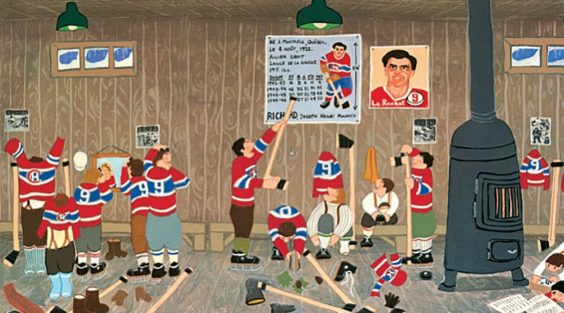 This beloved Canadian children’s book is being turned into a Montreal Musical
This beloved Canadian children’s book is being turned into a Montreal Musical
Owing to the city’s 375th anniversary, the Segal Centre has commissioned The Hockey Sweater to be turned into a musical.
The Hockey Sweater: A Musical will pay homage to the classic Quebec book by reinventing the tale, and turning it into a modern musical for the whole family.
When: October 19-November 12, 2017
Where: The Segal Centre for Performing Arts, 5170 Chemin de la Côte-Sainte-Catherine
Check the website for updates.
